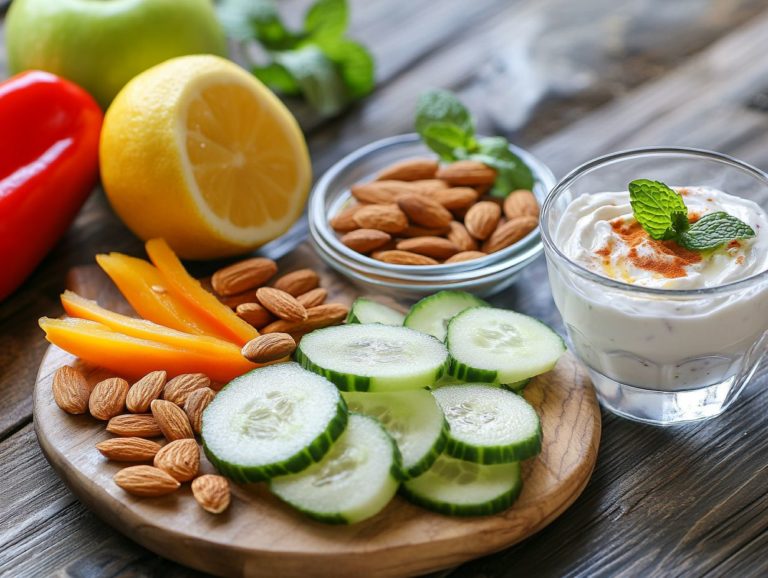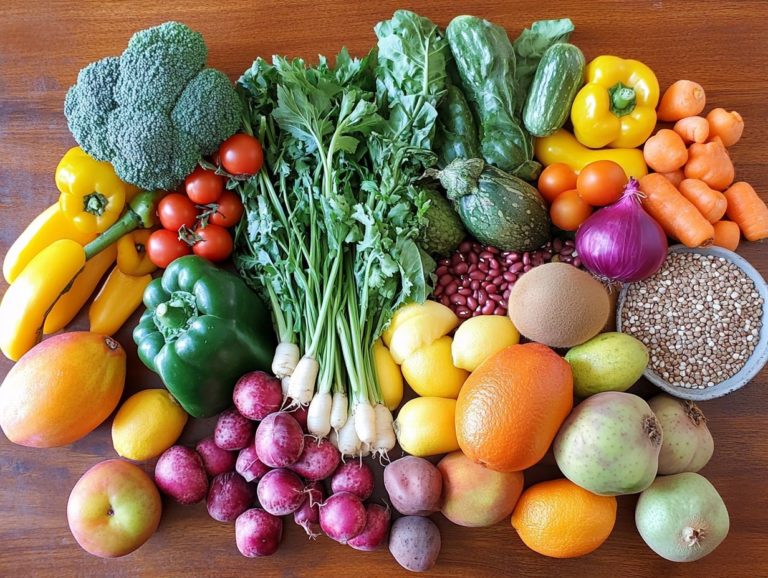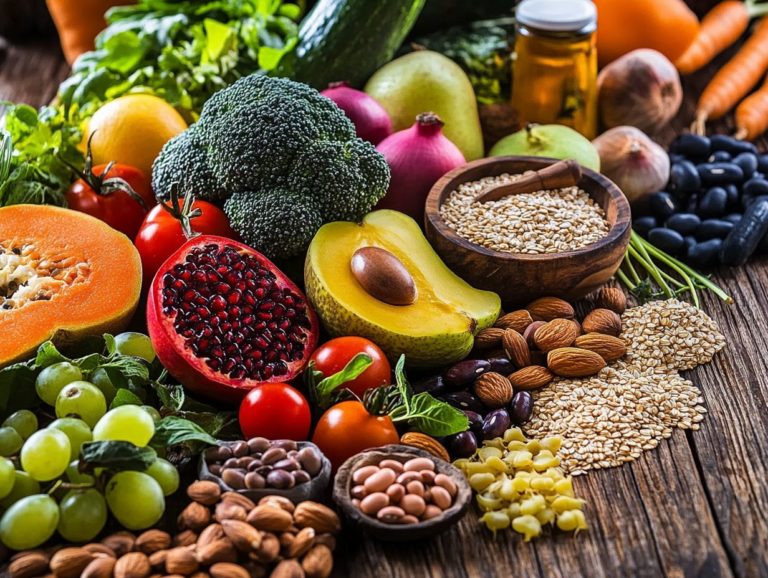The Benefits of a Detox Diet: What You Should Know
Curious about detox diets and their effects on your health? This article delves into everything you need to know about detoxification their core purpose, the science behind them, and the various types at your disposal.
You ll discover the physical and mental benefits, how to embark on this journey, and the potential risks that might arise along the way.
By the end, you’ll possess a comprehensive understanding of detox diets, empowering you to make an informed decision about whether one is the right choice for you.
Contents
Key Takeaways:
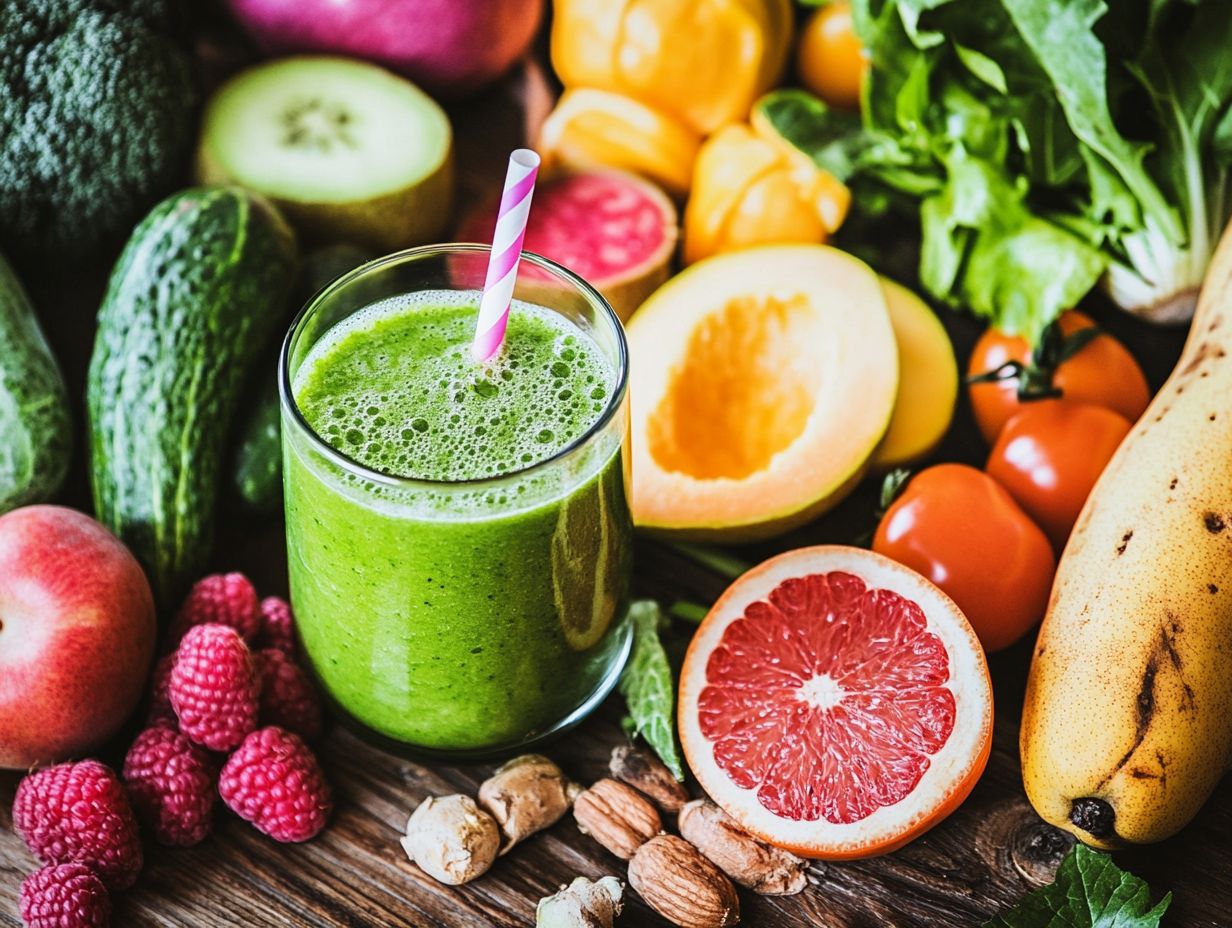
Ready to discover the life-changing benefits of a detox diet? A detox diet promotes the elimination of toxins from the body, leading to improved physical and mental well-being. The benefits of a detox diet include improved organ function, increased energy, and clearer skin. Before starting a detox diet, it is important to consult with a healthcare professional and to carefully plan meals to ensure proper nutrition and avoid potential side effects.
What is a Detox Diet?
A detox diet is a carefully planned way of eating aimed at removing toxins from your body and enhancing your overall health and wellness.
A detox diet focuses on eating whole foods. It excludes processed foods, refined sugars, and unhealthy fats while emphasizing the principles of clean eating.
The rising popularity of detox diets stems from many health claims, prompting individuals to seek the expertise of registered dietitians for a safe and effective strategy.
The Cleveland Clinic advises that, while detoxification can indeed support your liver and kidney function, it’s crucial to recognize that your body possesses its own inherent detoxification systems.
How Does a Detox Diet Work?
Detox diets operate by enhancing your body s natural detoxification processes and supporting key organs like the liver and kidneys as they work to eliminate toxins.
These diets emphasize the importance of hydration, balanced electrolyte levels, and optimal nutrient absorption to bolster your body s detoxification capabilities.
By prioritizing whole foods, incorporating herbal supplements, and following targeted fasting protocols, you can aim to elevate your energy levels and improve your metabolic health.
Benefits of a Detox Diet
The benefits of a detox diet can transform your health and energy levels! These diets often result in weight loss, heightened energy levels, and improved metabolic health.
When you participate in detoxification programs that may include calorie restriction and fasting, you might notice significant improvements in digestion and nutrient absorption.
These diets can inspire a holistic approach to health, encouraging lifestyle changes that support your long-term well-being.
Physical and Mental Benefits
A detox diet can provide you with a wealth of physical and mental benefits, from improved energy levels and weight loss to enhanced metabolic health. You might also notice psychological improvements, such as increased focus and clarity.
For example, those who adopt clean eating often find that their digestion improves significantly. By cutting out processed foods and refined sugars, which can lead to bloating and fatigue, they experience a newfound sense of well-being.
These diets introduce you to whole, nutrient-rich foods that invigorate your body, making you feel more vibrant and alert throughout your day.
The mental clarity gained from a detox diet can sharpen your decision-making and boost your productivity, as many have experienced firsthand.
By prioritizing fresh fruits, vegetables, and proper hydration, you re not only shedding unwanted pounds but also enhancing your overall wellness. This approach leads to a holistic transformation that resonates deeply within you.
Explore how a detox diet might be the refreshing change you need today!
Detoxification of Specific Organs
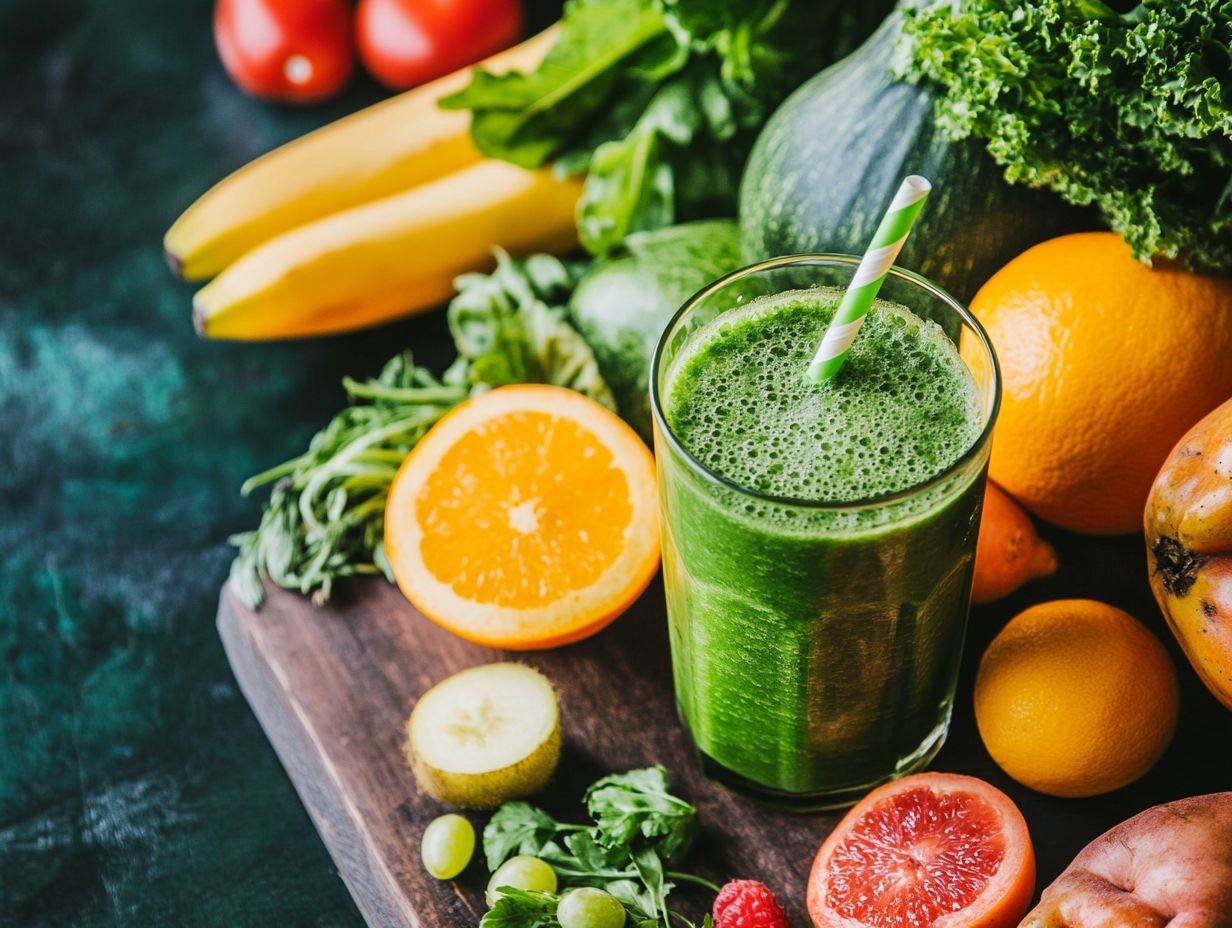
Detox diets often focus on the detoxification of key organs specifically the liver, kidneys, and colon because they play a vital role in eliminating toxins from your body. Engaging in specialized detox programs can support these organs, enhancing their function and overall health.
Take the liver, for example. It serves as your body s primary filtration system, breaking down harmful substances and processing nutrients. Liver-focused diets usually include antioxidant-rich foods like beetroot and leafy greens, which may help promote liver regeneration.
For kidney support, staying hydrated is crucial. Consuming diuretics like cucumber and watermelon is believed to help flush out waste products.
Colon cleanses often feature fiber-rich foods and herbal teas, claiming to enhance digestion by promoting regular bowel movements and ensuring efficient waste elimination.
Popular detox programs, such as the Master Cleanse and juice cleanses, showcase various methods aimed at boosting these vital organs’ natural detoxification abilities.
Types of Detox Diets
You ll find a range of detox diets available, each offering a unique approach to purifying your body.
From juice cleanses to fasting protocols and programs centered around herbal supplements, there s something for everyone. These diets typically prioritize clean eating, encouraging whole foods while steering clear of processed options.
Popular Detox Diets and Their Differences
Popular detox diets include juice cleanses, fasting protocols, and those featuring herbal supplements, each providing unique benefits and mechanisms for detoxification. These approaches differ significantly in duration; some last just a few days, while others may extend over weeks.
For instance, you might embark on a juice cleanse that spans three to seven days, focusing solely on liquid intake to flush out toxins. In contrast, intermittent fasting protocols can be maintained indefinitely, emphasizing designated eating windows.
When considering herbal supplement detox plans, specific durations are often recommended based on the herbs you choose and their intended effects. It s crucial to weigh the pros and cons of each diet.
Juice cleanses can offer quick weight loss, but they might also lead to nutrient deficiencies if followed for too long. Fasting protocols can enhance mental clarity but may not be suitable for everyone, especially those with certain health conditions.
How to Start a Detox Diet
Embarking on a detox diet requires careful preparation to understand what to embrace and what to avoid for the best possible results.
This transition often entails significant lifestyle adjustments, focusing on clean eating, proper hydration, and incorporating whole foods into your daily routine.
Preparing for a Detox Diet
Preparation for your detox diet is essential and involves a thoughtful transition to a clean eating regimen. Prioritizing hydration and recognizing lifestyle changes will support your journey.
Embracing this process can greatly enhance the effectiveness of your detox experience. Start by introducing more whole foods, such as vibrant fruits and fresh vegetables, which provide a natural source of vital vitamins and minerals.
Hydration plays a key role; aim to drink plenty of water throughout the day. Consider incorporating herbal teas or infused water for a refreshing twist.
As you navigate this transition, gradually replacing processed foods with healthier alternatives eases the change and helps mitigate any withdrawal symptoms. By following these steps, you can achieve a smoother and more successful detoxification process.
Ready to start your detox? Let s dive in!
What to Eat and What to Avoid
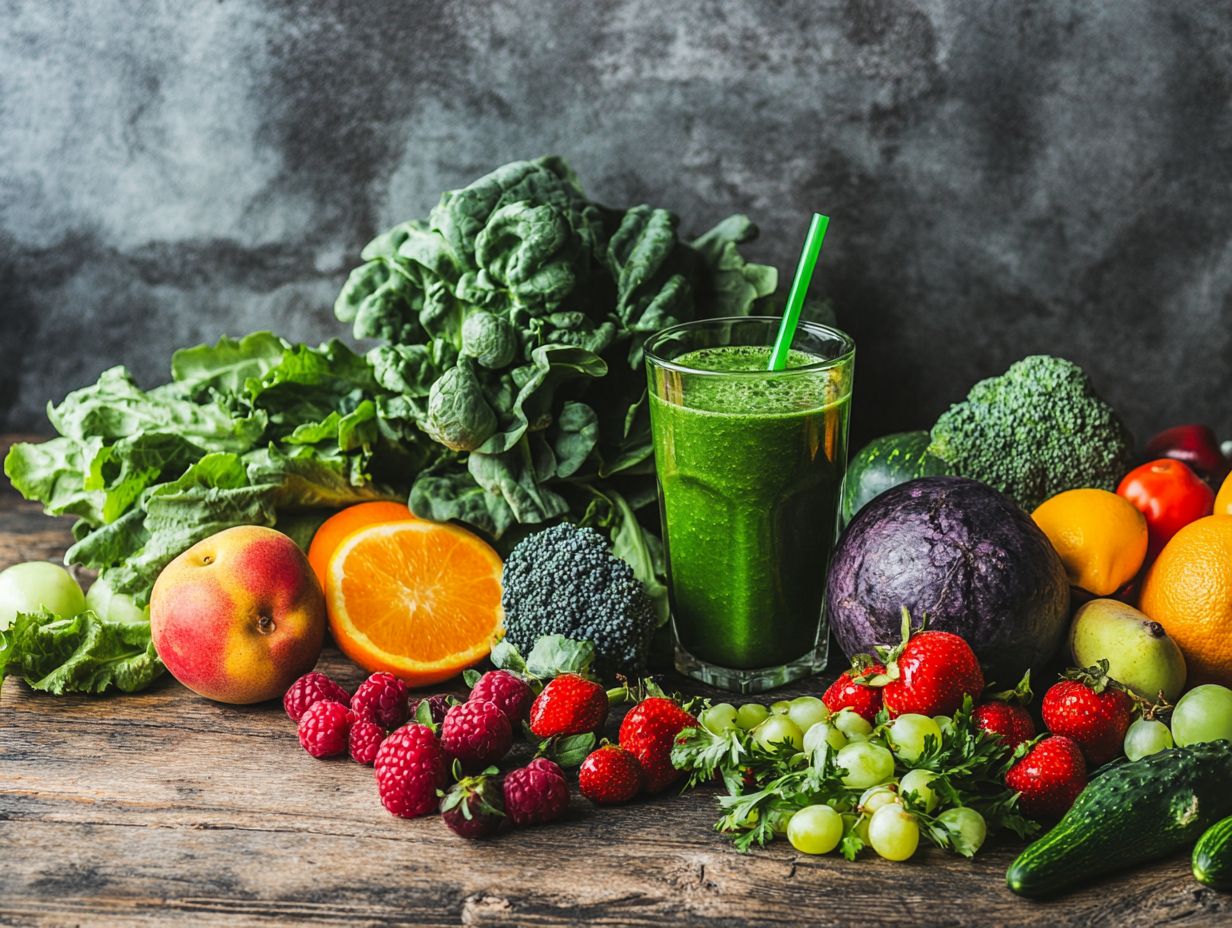
Start your detox diet by consuming whole foods. Focus on vibrant fruits, fresh vegetables, and hearty whole grains.
Incorporating a colorful array of fruits helps boost the detox process. Berries, apples, and citrus are packed with antioxidants and essential vitamins.
Leafy greens, such as spinach and kale, are particularly beneficial. They offer vital nutrients that support liver function.
Whole grains like quinoa and brown rice provide fiber that aids digestion. Avoid processed snacks, refined sugars, and artificial additives.
These culprits can trigger inflammation and disrupt your metabolism. By prioritizing wholesome foods, you enable your body to eliminate toxins more effectively while enhancing your overall health.
Explore Potential Risks and Side Effects
Detox diets can indeed offer health benefits. However, be aware that they can also pose risks, including nutritional deficiencies and other health complications.
Seeking medical advice before embarking on any detoxification program is essential for ensuring your well-being.
Common Side Effects and How to Manage Them
Common side effects of detox diets include headaches, fatigue, and gastrointestinal discomfort. These issues are typically triggered by sudden dietary shifts or nutritional deficiencies.
To effectively manage these effects, introduce dietary changes gradually. This approach gives your body a chance to adjust without feeling overwhelmed.
Incorporating a variety of nutrient-rich foods can significantly alleviate symptoms. Staying well-hydrated is another key factor; sipping water throughout the day can help reduce headaches and support digestion.
If side effects persist beyond a couple of days or worsen, seeking medical advice is wise. This may indicate the need for a more tailored approach to your diet and overall wellness.
Final Thoughts and Recommendations
While detox diets may offer various health claims and benefits, approach them with caution. Seek personalized advice from a medical professional.
These diets often claim to cleanse the body and boost energy levels, but may not be suitable for everyone. Consider your unique health conditions, dietary needs, and lifestyle before diving into such a regimen.
Consulting with healthcare professionals ensures that your approach is safe and takes into account any underlying health issues. A sustainable approach to nutrition typically leads to enduring results over fleeting detoxification methods.
Detox Products and Supplements
Detox products and supplements have gained significant traction. They often come with bold health claims aimed at those seeking quick solutions for cleansing their bodies.
However, scrutinize these offerings carefully. Consider the FDA’s regulations regarding their safety and effectiveness.
Being informed enables you to make decisions that prioritize your health.
Evaluating Detox Products
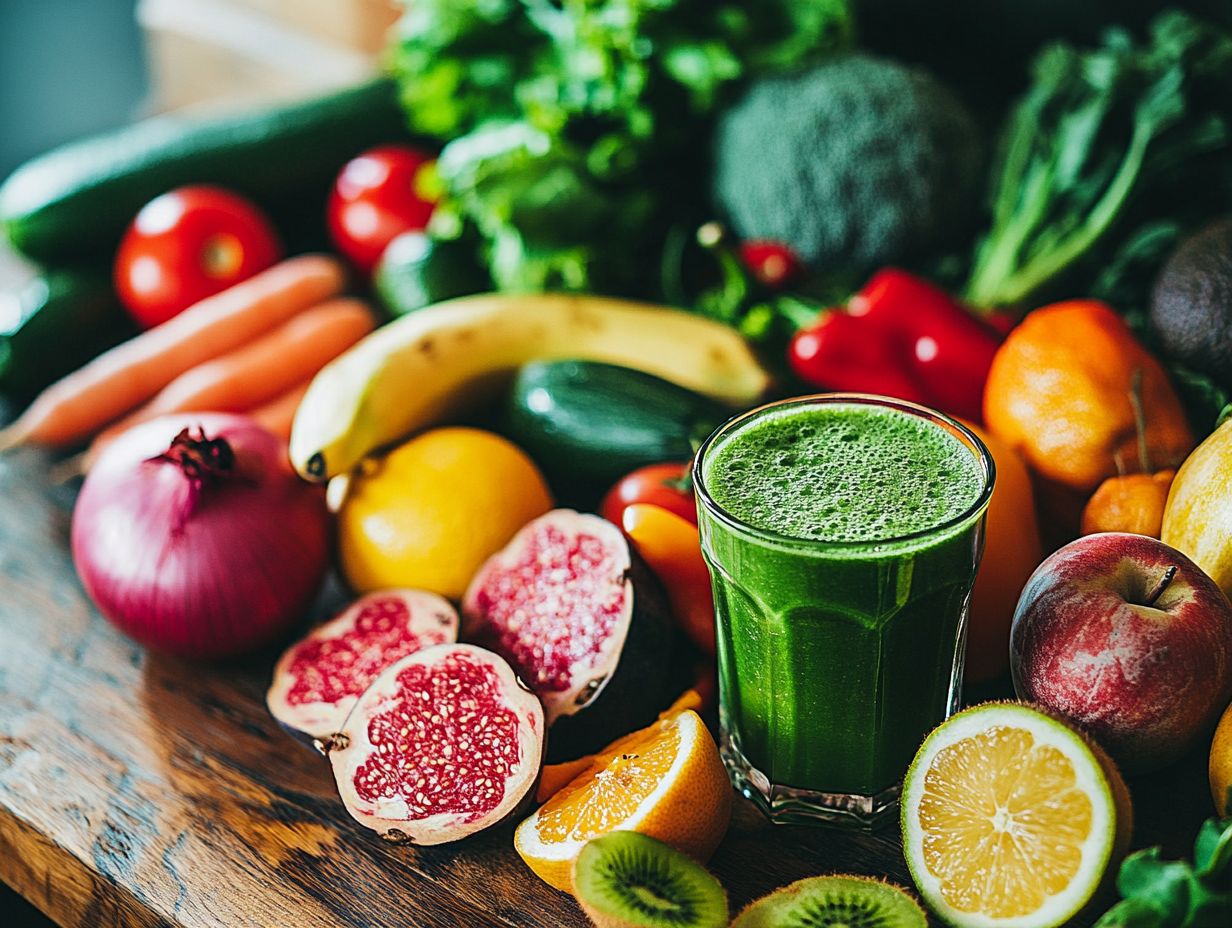
When evaluating detox products, consider the claims made by manufacturers. Assess whether these claims hold up under scientific scrutiny or comply with FDA standards.
Dig deeper into the ingredient list to determine both safety and effectiveness. Be vigilant about potentially harmful substances that might not be obvious, and prioritize natural ingredients with documented benefits.
The credibility of the manufacturer is crucial for the reliability of any detox product. Investigate the company s reputation, read customer reviews, and evaluate their transparency regarding sourcing and production methods for valuable insights.
Ultimately, a well-rounded approach fostering critical thinking and thorough research will empower you to make informed decisions. This helps you avoid misleading health claims that often pervade the industry. Start your journey to a healthier you today by researching detox products carefully!
FAQ
What is a detox diet and how does it work?
A detox diet is a dietary plan aimed at removing harmful substances from the body. It involves consuming specific foods and drinks while avoiding those that contribute to toxicity.
This diet works by boosting the intake of nutrients that support the body’s natural detoxification processes, such as fiber, antioxidants, and water, while reducing exposure to potential toxins.
What are the benefits of a detox diet?
There are several potential benefits, including improved digestion, clearer skin, weight loss, increased energy levels, and enhanced overall health. Eliminating processed foods can also reduce inflammation and promote a healthier gut microbiome.
Are there any risks associated with a detox diet?
While a detox diet can offer many benefits, always consult a healthcare professional before starting one to avoid potential risks. Some may include nutrient deficiencies, dizziness, fatigue, or reactions to specific detoxifying foods.
Pregnant or breastfeeding women, individuals with certain medical conditions, and those taking medications should avoid a detox diet.
How long should a detox diet last?
The duration of a detox diet varies by individual goals and preferences. Some may follow it for a few days, while others may extend it to several weeks.
Most people find it helpful to start with a short period, such as 3-5 days, and gradually increase if desired. It’s crucial to listen to your body and end the detox if you experience any negative symptoms.
What foods should I avoid on a detox diet?
A typical detox diet often involves avoiding processed and high-fat foods, refined sugars, alcohol, caffeine, and dairy products. It’s also wise to limit or eliminate foods known to cause inflammation, like gluten and nightshade vegetables.
Focus on consuming whole, nutrient-dense foods and staying hydrated with water and herbal teas.
Can I exercise while on a detox diet?
Moderate exercise can be beneficial during a detox diet, as it supports the body’s natural detoxification processes and improves overall health. However, listen to your body and avoid strenuous exercises that may cause fatigue or excessive sweating, which can deplete your energy and nutrient stores.

